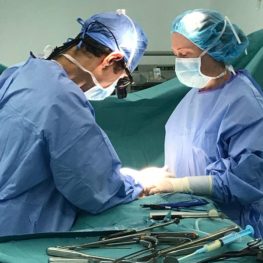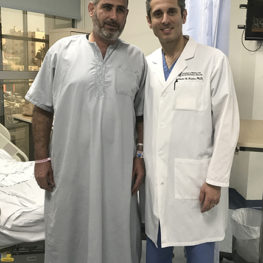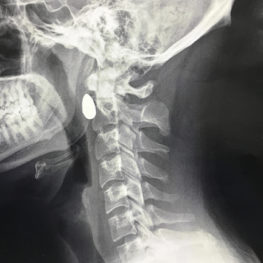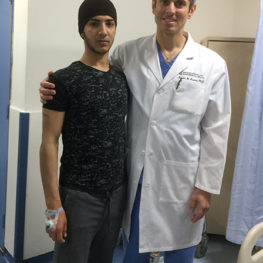April 13, 2017
Dr. Khalid Kurtom and his neurosurgery team from University of Maryland Shore Regional Health joined SAMS for medical mission to Amman, Jordan from April 7 – 14. Dr. Kurtom’s team joined a group of over 70 other medical professionals providing high quality, culturally appropriate medical care to refugees and the local community, including performing neurosurgeries for the first time on a SAMS medical mission. The neurosurgery team’s goal was to perform 30 cases in 6 days; these are a few of the stories.
Day 1: Healing a Healer & Adapting to Challenges
We arrived at Amman’s Istishari hospital at 6 am, excited and ready to start our day, only to find that the hospital is locked up for the night. The night guard let us in and we were kindly greeted by the overnight operating room staff, who graciously accommodated our requests as we sorted through surgical equipment. If anyone knows sterile processing, they will understand the amount of work that goes into cleaning and re-sterilizing instruments.
Our first scheduled patient, an elderly Syrian woman sitting in a wheelchair, came in surrounded by a loving family. She had been having difficulty walking for over five years and had begun having trouble using her arms. She has two issues, cervical spinal cord impingement and lumbar stenosis both of which affect her ability to walk. We couldn’t fix both in the same day, and as her evaluation revealed poor kidney function, she was admitted for further evaluations and re-scheduled for the next day.
 Next, we met a dentist who cares for Syrian refugees. For 10 years he has had neck pain which was attributed to his long dental career. However, over the last year or so he has developed bilateral numbness in his arms and hands and has been losing grip strength which causes him to drop instruments unawares. He was prepped for surgery and we began our day.
Next, we met a dentist who cares for Syrian refugees. For 10 years he has had neck pain which was attributed to his long dental career. However, over the last year or so he has developed bilateral numbness in his arms and hands and has been losing grip strength which causes him to drop instruments unawares. He was prepped for surgery and we began our day.
Challenges come in many forms. We found camaraderie with our Istishari counterparts in the knowledge that surgery requires the ability to adapt to any given challenge. Yet, to see the dentist leave the hospital the same day gave us peace in knowing that we made a difference. Not only for this patient, but also those he serves. In one day, we treated four people with severe spine pathology.
Day 2: Community Support as Survival
 We began our day at 7 am, which seemed luxurious, visiting patients from our previous surgeries. We rounded on the remaining spinal fusion patient who was up and smiling. He had been awake and walking, and eagerly demonstrated his new strength. Before the war, he worked as a driver in Syria, but fled from Syria with his family five years ago. He has been unable to work in Jordan due to severe back and leg pain. As he told us about his son who remains in Syria, a small cloud came over his face. His 19 year old son, who works as a cook in the camp, hopes to come to the USA and attend university.
We began our day at 7 am, which seemed luxurious, visiting patients from our previous surgeries. We rounded on the remaining spinal fusion patient who was up and smiling. He had been awake and walking, and eagerly demonstrated his new strength. Before the war, he worked as a driver in Syria, but fled from Syria with his family five years ago. He has been unable to work in Jordan due to severe back and leg pain. As he told us about his son who remains in Syria, a small cloud came over his face. His 19 year old son, who works as a cook in the camp, hopes to come to the USA and attend university.
Many of our cases were all very challenging with complex pathologies, much more advanced forms of disease than we typically see back home. Neurosurgery simply does not exist here in any capacity, so people are left devastated for years, sometimes their entire lives, due to illnesses that are surgically curable.
What is clear is that the close knit social structure here allows people to survive. Their families and communities rally around them, providing crucial support. One of our patients had been in a wheelchair for 5 years, with her daughters assuming full care for her without any additional resources. The people we met are kind and generous despite not having all the resources they need. There was always laughter, food and good time. They were always welcoming and grateful for anything and everything. We all wish we could do more.
Day 4: A Bullet Extraction & Spinal Decompression
 Our first patient today was a 21 year-old Syrian refugee who was shot along with one of his cousins in 2013 outside their home in Syria by a rifle. His cousin became a quadriplegic. Our patient was shot in similar location but was extremely lucky. The bullet stopped a centimeter away from his spinal cord at C2; he could have lost his ability to breathe on his own and died immediately.
Our first patient today was a 21 year-old Syrian refugee who was shot along with one of his cousins in 2013 outside their home in Syria by a rifle. His cousin became a quadriplegic. Our patient was shot in similar location but was extremely lucky. The bullet stopped a centimeter away from his spinal cord at C2; he could have lost his ability to breathe on his own and died immediately.
Although he survived, our patient suffered from severe neck pain radiating to his head with every head movement. He was severely disabled, now unemployed living in the refugee camp. Our operation aimed to extract the bullet from this very difficult location. When the bullet came out of his neck, people in the operating room clapped, most were in tears. It was miraculous. He woke up pain free, very emotional, in disbelief. He was discharged home an hour after surgery but decided to come back with many of his friends to take pictures with our team. He now has his life back. We are blessed to have been part of it.
Another case, a Syrian refugee living in camps, suffered from an inability to walk after several lumbar spine surgeries. She hadn’t been able to walk for 10 years. We performed a difficult procedure: a spinal decompression and fusion. We had humble expectations, and warned her that the operation may not improve her foot. We were shocked when she had full strength in her foot on the morning after surgery and was able to walk without any assistance. As she walked on her own, she just continued to pray for our kids and families, the best gift and reward we could have hoped for.
These cases were not only technically very challenging but emotionally draining. We continued to search deep within us for the strength to continue this journey.
Day 5: An Incredible Recovery
When our patient’s parents fled Syria, their son was determined to stay behind and finish his education. However, the situation became too dangerous, and after completing the ninth grade, he joined his family in Jordan. There, he had been in great pain for three years, unable to work, unable to walk upright.
 We reassured him and his mother that he will walk upright again; they were not convinced. He was nervous that this surgery would not improve his condition. His spinal fusion surgery was completed without complications, but still, he feared movement. The next morning, we found this young man lying in bed, afraid to move. He was convinced that he would keep still in bed, his worried mother by his side. We encouraged him to get out of bed. With trepidation he sat up and stood up straight for the first time in years. His mother couldn’t believe her eyes. As we took a photo together, he asked to be tagged in Facebook, reminding us that we are not so different after all.
We reassured him and his mother that he will walk upright again; they were not convinced. He was nervous that this surgery would not improve his condition. His spinal fusion surgery was completed without complications, but still, he feared movement. The next morning, we found this young man lying in bed, afraid to move. He was convinced that he would keep still in bed, his worried mother by his side. We encouraged him to get out of bed. With trepidation he sat up and stood up straight for the first time in years. His mother couldn’t believe her eyes. As we took a photo together, he asked to be tagged in Facebook, reminding us that we are not so different after all.
Our next patient had 2 previous laminectomies, or decompression surgeries, without much relief. She had been wheelchair bound for five years. Her previous postoperative course from her last surgery consisted of bed-rest for 45 days. We completed her operation without complications, which was very difficult due to previous scar tissue and the degree of compression on her nerves. She walked for the first time in five years, surrounded by her family and friends who could not believe their eyes. An incredible recovery!
Day 6: To Anyone Reading This
Neurosurgery in this part of the world is scarce and usually avoided due to the high complication and mortality rate, even for the more straight forward operations. After being here for a few days, a reputation developed and people started to take notice. Doctors, nurses, hospital employees and friends of patients that we operated on began to request consultation for their family members. For the past couple of days, we had to sneak out of the hospital to avoid the crowd outside waiting for us with their MRI’s and films.
We want to help everyone but it is clear that the resources and time is limited and we can’t help everyone. The disappointment that we feel for these people and their suffering is tremendous, and emotionally tasking. So much hurt and need exists here and people are desperate. We leave this mission completely drained, and full of emotions that will take us some time to absorb and understand.
We are forever changed. We are so appreciative of everything we have back at home and how lucky we really are. To anyone reading this we have two requests: Please call everyone you care about and tell them that you love and appreciate them; and always keep things in perspective because things can be worse. God bless.

